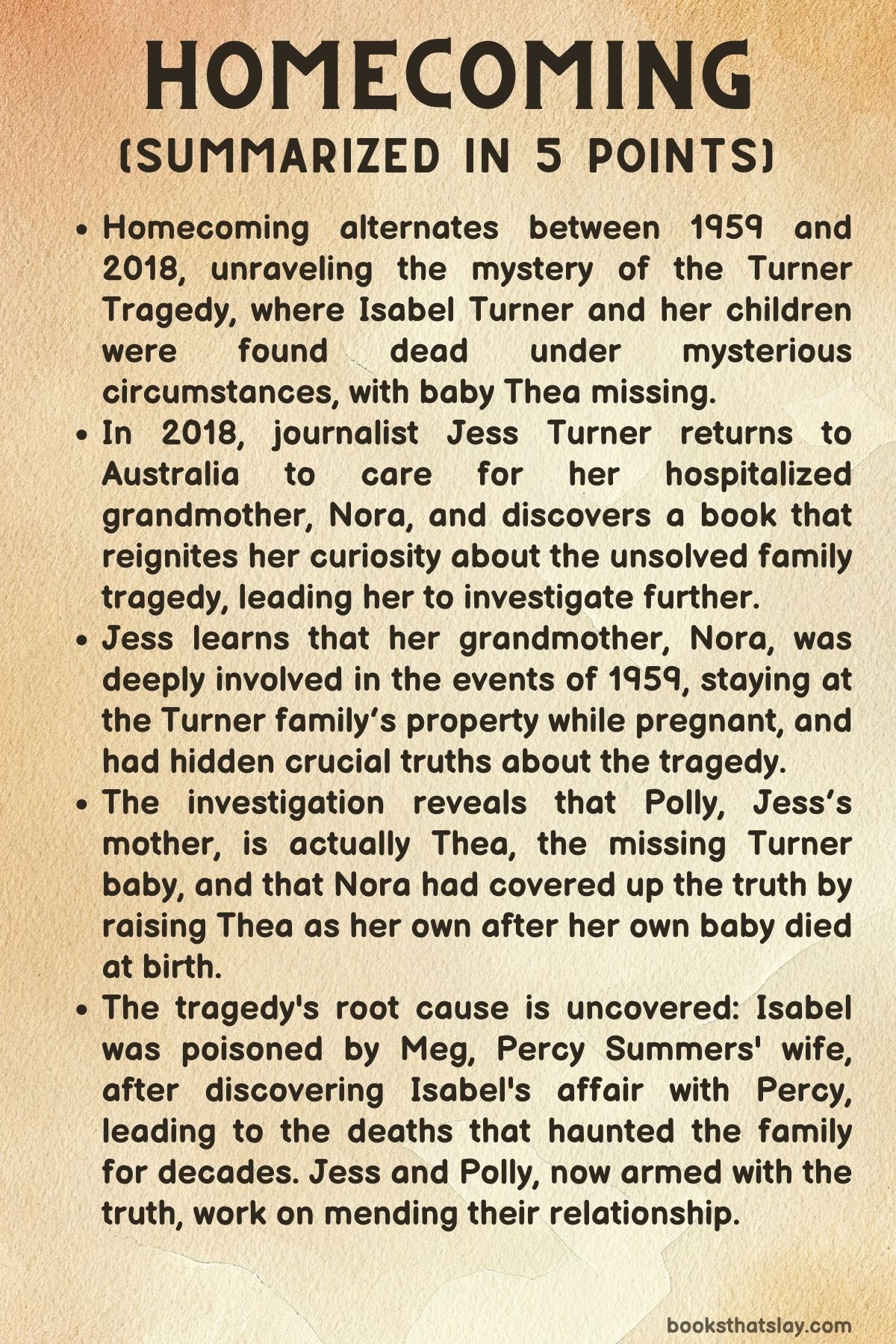Homecoming by Kate Morton Summary, Characters and Themes
“Homecoming,” is the seventh novel by Kate Morton. Set against the evocative Australian landscape, this intricately woven narrative delves into the haunting mysteries of family secrets, complex relationships, and the impact of past events on the present.
Through alternating timelines, Morton masterfully explores the layers of a tragic mystery, blending historical fiction with a contemporary investigation. The novel captures the essence of Morton’s signature style: compelling mysteries intertwined with rich character development, all set within a deeply atmospheric setting.
Summary
The plot unfolds in two distinct timelines, 1959 and 2018, gradually uncovering the chilling truth behind the Turner Tragedy—a mystery that has lingered unsolved for decades. The tragic event revolves around the shocking discovery made by Percy Summers, who stumbles upon the lifeless bodies of Isabel Turner and her children during what appeared to be a serene picnic.
With no clear cause of death and only the absence of Isabel’s baby, Thea, as a clue, the community of Tambilla, along with the police, conclude that Isabel poisoned herself and her children.
This assumption becomes the accepted narrative, overshadowing any deeper investigation into the tragedy and leaving Thea’s fate a haunting mystery.
Fast forward to 2018, Jess Turner, a journalist living in London, returns to her native Australia when her grandmother, Nora, suffers a severe fall. While visiting Nora’s house, Jess uncovers a book titled “As If They Were Asleep,” authored by Daniel Miller.
This book, written shortly after the Turner Tragedy, uses a blend of creative nonfiction to explore the inner lives of those involved in the mystery, including Isabel herself. Though the book delves into the circumstances surrounding the tragedy, it ultimately leaves many questions unanswered.
Jess, driven by her journalistic curiosity and the personal connection to the case, embarks on an investigation to unearth the truth behind what happened to her family in 1959.
In 1959, the narrative transports the reader to Christmas Eve, when Percy Summers discovers the seemingly peaceful yet inexplicably dead Turner family near a waterhole on their property, Halcyon.
The shocking scene plunges the town of Tambilla into a frantic search for the missing baby, Thea, and an intense murder investigation. Despite the coroner’s inconclusive findings, the community swiftly accepts the theory that Isabel, overwhelmed by life, committed a desperate act of murder-suicide.
As Jess digs deeper in 2018, she uncovers that her grandmother Nora was more entwined with the events of 1959 than she had ever let on. Nora, who was pregnant and staying at Halcyon during the time of the tragedy, gave birth prematurely to Polly, Jess’s mother, soon after the incident.
Nora’s role in the family’s history becomes more suspicious as Jess learns that her grandmother had often portrayed her mother, Polly, as emotionally fragile, even recounting a disturbing tale where Polly allegedly tried to harm Jess as a baby.
However, Jess’s discovery that Nora had previously told the same story about Isabel leads her to question the truthfulness of her grandmother’s accounts.
Jess’s investigation takes a critical turn when she and Polly, seeking to reconcile their strained relationship, work together to solve the family mystery.
With the help of Daniel Miller’s interview notes and a recording he left for Polly, Jess uncovers the shocking revelation that Nora’s baby did not survive birth, and that Polly is, in fact, Thea—the missing Turner baby.
This truth is buried under years of deception, as Nora had secretly buried her own child and raised Thea as her daughter.
The final pieces of the puzzle reveal that Isabel was having an affair with Percy Summers, and Thea was their child. In a twisted turn of events, Percy’s wife, Meg, seeking revenge after discovering the affair, poisoned Isabel with a deadly toxin from a pufferfish. Believing only Isabel would consume it, Meg’s actions led to the tragic deaths that haunted the Turner family for decades.
In the end, Jess and Polly, armed with this newfound understanding of their family’s past, begin to rebuild their relationship, visiting Tambilla to reconnect with their extended family and find closure in the place where their story began.

Characters
Jess Turner
Jess Turner is a central character in Homecoming, and her journey of discovery drives much of the novel’s narrative. A journalist living in London for the past decade, Jess returns to Australia after her grandmother, Nora, is hospitalized.
Jess is portrayed as determined and inquisitive, traits that align with her profession and compel her to unravel the truth behind the Turner Tragedy. Her relationship with her mother, Polly, is strained, and throughout the novel, Jess grapples with feelings of abandonment and resentment.
As she delves deeper into the mystery, Jess undergoes significant emotional growth. She gradually understands the complex dynamics within her family and questions the narratives she has been told.
Her arc is one of reconciliation, not only with her mother but also with her own identity. She comes to terms with the painful truths of her family’s past.
Nora Turner
Nora Turner is a pivotal figure in both timelines of the novel, serving as a linchpin in the unfolding mystery. In 1959, she was staying at Halcyon during the tragic events that claimed the lives of Isabel Turner and her children.
Nora’s character is complex; she is depicted as strong-willed and secretive, traits that significantly impact those around her. Her actions and decisions, particularly the ones surrounding the fate of her daughter, Polly, and her role in the Turner Tragedy, cast a long shadow over the lives of Jess and Polly.
Nora’s manipulation and gaslighting, especially the fabrication of stories that cast doubt on Polly’s fitness as a mother, reveal a darker side to her character. Her death in 2018 leaves many questions unanswered, but through Jess’s investigation, Nora’s true motivations and the burdens she carried are gradually unveiled.
The story paints a picture of a woman deeply affected by grief, loss, and a desire to protect her family, albeit in misguided ways.
Polly Turner/Thea
Polly Turner, originally Thea, is another key character whose life is shaped by the events of 1959. Believing herself to be Nora’s daughter, Polly has lived with the psychological scars of being considered fragile and unfit by her own mother.
This perception has strained her relationship with her daughter, Jess, leading to years of distance and unresolved tension. Polly’s character is one of quiet resilience, despite the emotional turmoil she endures.
As the novel progresses, it is revealed that Polly is actually Thea, Isabel’s daughter, who was saved by Nora and raised as her own after the tragedy. This revelation forces Polly to confront her identity and the lies that have defined her life.
Her eventual reconciliation with Jess marks a turning point in the novel. Both mother and daughter begin to heal from the past and forge a new relationship based on truth and understanding.
Isabel Turner
Isabel Turner is the tragic figure at the heart of the Turner Tragedy. As a mother of three in 1959, she is depicted as a loving but troubled woman, trapped in a marriage that does not fulfill her emotional needs.
Isabel’s affair with Percy Summers reveals her vulnerability and desire for connection outside her marriage. Her death, along with that of her children, is initially shrouded in mystery, with the local community quick to blame her for the tragedy.
However, as the novel progresses, it becomes clear that Isabel was a victim of circumstances beyond her control, particularly the vindictive actions of Meg Summers. Isabel’s character embodies themes of love, loss, and betrayal.
Her story serves as a poignant reminder of the harsh judgments society can impose on women, especially in the context of family and motherhood.
Percy Summers
Percy Summers is a significant character whose actions indirectly trigger the tragic events of 1959. A farmer and the father of Marcus, Percy is portrayed as a man of few words but with deep emotions that he struggles to express.
His affair with Isabel Turner is a key plot point, highlighting his dissatisfaction with his own life and his yearning for something more. Percy’s relationship with Isabel, while tender, ultimately leads to devastating consequences.
His guilt over the affair and the subsequent deaths of Isabel and her children haunt him, making him a tragic figure burdened by the knowledge of what his actions have set in motion. Percy’s character underscores the themes of guilt, responsibility, and the far-reaching impact of personal choices.
Marcus Summers
Marcus Summers, the son of Percy Summers, is a character driven by anger and a sense of betrayal. Upon discovering his father’s affair with Isabel, Marcus’s reaction is one of fury and resentment.
His plan to poison Isabel, motivated by a desire for revenge, sets the stage for the novel’s central tragedy. Marcus is depicted as impulsive and vindictive, his actions fueled by a deep-seated need to punish those he believes have wronged him.
Although his plan is ultimately thwarted by his mother, Meg, Marcus’s character represents the destructive power of unchecked emotions and the devastating effects they can have on others.
Meg Summers
Meg Summers is a character whose actions are pivotal in the tragic outcome of the Turner family. As Percy’s wife, Meg is aware of his affair with Isabel and, in a moment of vengeance, decides to use the pufferfish toxin to poison Isabel.
Meg’s character is complex; while her actions are undeniably cruel, they are also driven by a deep sense of hurt and betrayal. Her decision to go through with the poisoning, despite knowing the potential consequences, marks her as a figure of tragic proportions.
Meg embodies the destructive potential of jealousy and revenge. Her character serves as a reminder of the devastating impact that unresolved pain and anger can have on individuals and those around them.
Daniel Miller
Daniel Miller is the author of As If They Were Asleep, the book within Homecoming that delves into the Turner Tragedy. His character is somewhat enigmatic, serving as both a narrator of the past and a key to unlocking the mystery.
Through his creative nonfiction, Daniel offers insights into the minds of those involved in the tragedy. He ultimately refrains from drawing definitive conclusions.
His relationship with the Turner family, particularly with Nora, adds another layer of complexity to his character. Daniel’s role in the novel is crucial, as his work provides Jess with the information she needs to piece together the truth.
His character highlights the importance of perspective and narrative in understanding history.
Themes
The Complexity of Family Dynamics
One of the central themes in Kate Morton’s Homecoming is the complexity of family dynamics. The novel delves deeply into the relationships between the women of the Turner family across generations, highlighting how past events and concealed truths have long-lasting effects on their lives.
Jess’s fraught relationship with her mother, Polly, is at the forefront, marked by years of resentment and estrangement. This tension is rooted in the manipulations of Nora, who casts Polly as a fragile and unfit mother, thereby driving a wedge between mother and daughter.
The novel reveals how Nora’s actions were influenced by her own grief and loss, leading her to perpetuate a cycle of deception and control. As Jess uncovers the truth about her family’s past, including the fact that Polly is actually Isabel’s daughter, Thea, the narrative illustrates how family members can be both victims and perpetrators of emotional harm.
The resolution of these tensions, as Jess and Polly begin to rebuild their relationship, underscores the possibility of healing and reconnection, even after years of damage.
The Burden of Secrets and Lies
Another prominent theme in Homecoming is the destructive power of secrets and lies, particularly within the context of family history. The Turner Tragedy, around which the entire novel revolves, is steeped in mystery, with the truth obscured by decades of assumptions and half-truths.
The community’s acceptance of the theory that Isabel poisoned her children and herself is an example of how easily a lie can become accepted as truth when there is no evidence to challenge it. Nora’s decision to keep the truth about Thea’s parentage a secret, along with her manipulation of Polly and Jess’s relationship, demonstrates the heavy burden that secrets impose on those who keep them and those who are kept in the dark.
These secrets distort the characters’ understanding of themselves and each other, creating a legacy of pain that spans generations. As Jess uncovers the layers of deception, the novel explores the idea that only by confronting and revealing the truth can the characters begin to free themselves from the past’s hold and move forward.
The Impact of Grief and Loss
Grief and loss are pervasive themes in Homecoming, shaping the lives and actions of the characters in profound ways. Nora’s grief over the death of her own child, whom she secretly buried in the garden at Halcyon, drives much of the novel’s drama.
This loss leads her to adopt Thea as Polly, an act that, while motivated by love and a desire to fill the void left by her loss, ultimately causes significant harm. The tragedy of Isabel and her children also casts a long shadow, with the community’s inability to understand or come to terms with the event leaving a wound that festers for decades.
The novel portrays how unresolved grief can manifest in destructive ways, as seen in the actions of both Nora and Meg, who, driven by their own pain, contribute to the tragedy. Yet, the novel also offers a sense of hope in its conclusion.
By confronting and understanding their grief, the characters can begin to heal. The process of uncovering the truth about the past allows Jess and Polly to start anew, honoring the memory of those they have lost while also breaking free from the cycle of pain that has defined their family for so long.


